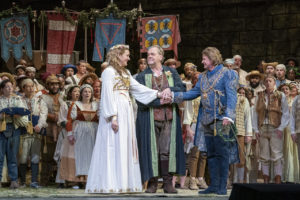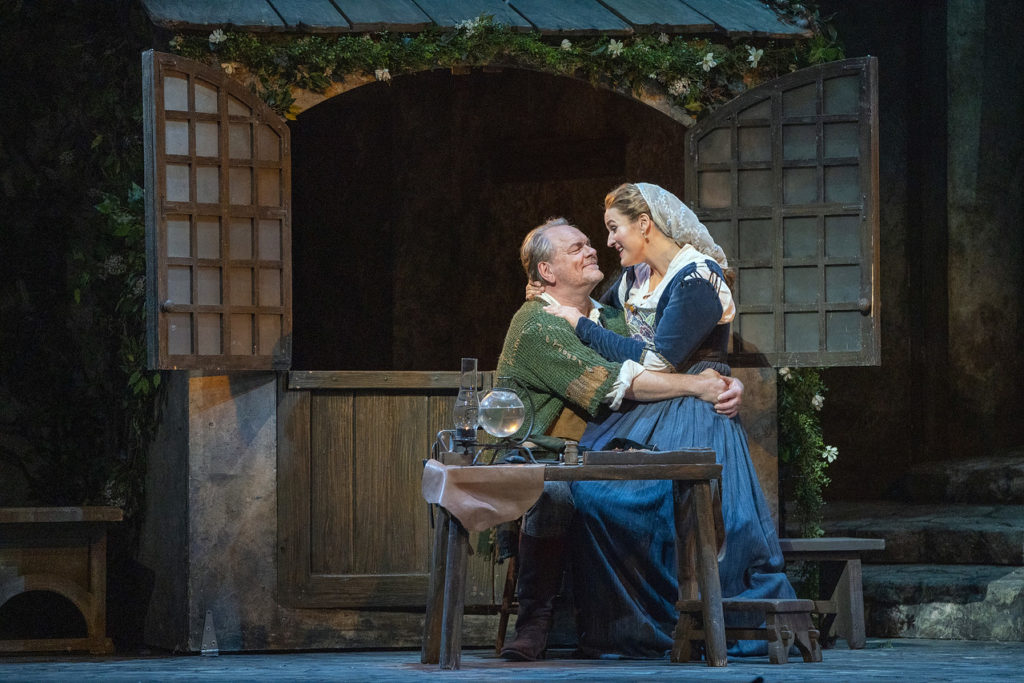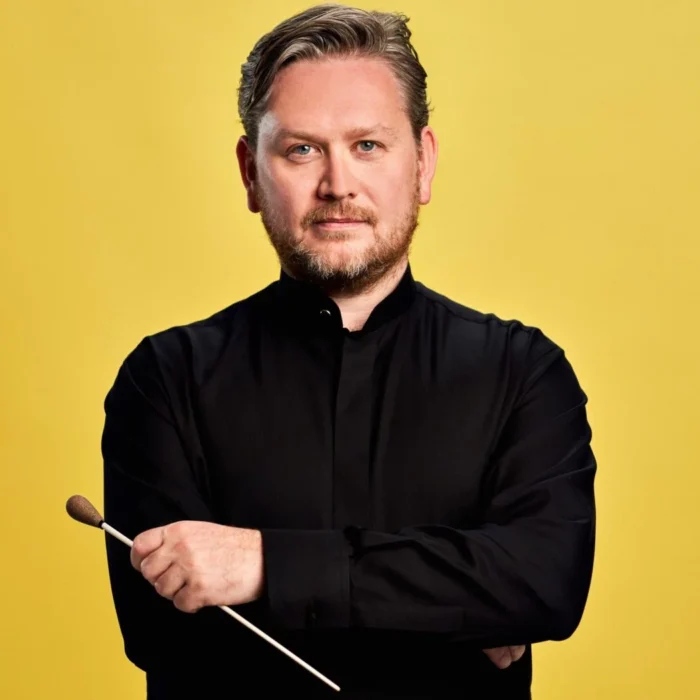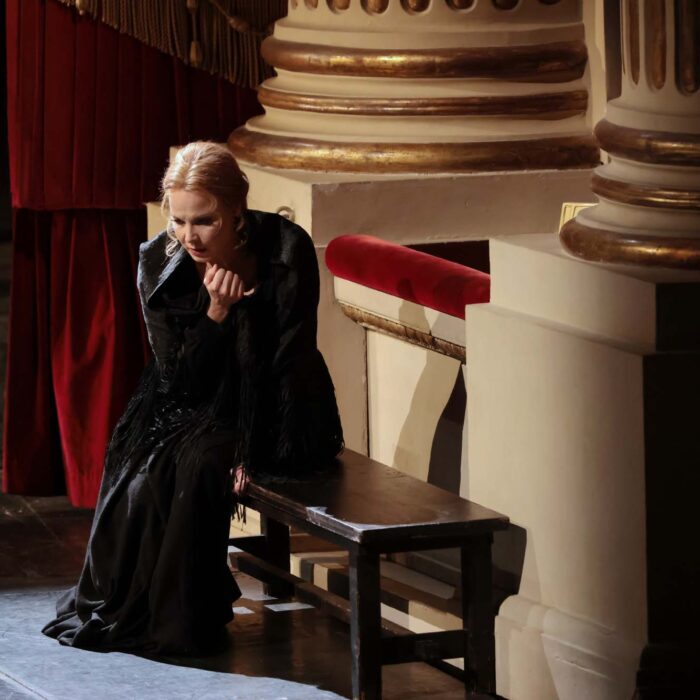
Metropolitan Opera 2021-22 Review: Die Meistersinger von Nürnberg
Antonio Pappano Leads an Interpretation of Musical & Dramatic Genius
By David Salazar(Credit: Richard Termine)
The Metropolitan Opera opened its revival of Wagner’s masterpiece “Die Meistersinger von Nürnberg” on Tuesday, Oct. 26, 2021 to a half-full hall.
I don’t usually bring up audience attendance because it is beside the point in terms of artistic merit and the integrity of performances. But given that we live in a “post-pandemic” world, there is no doubt that this brings up several questions.
The plethora of empty seats around the hall (particularly in the upper levels) no doubt has something to do with the opera’s length. An evening that starts right on time at 6 p.m. ended at around 11:45, give or take a few minutes. No doubt a lot of audience members shied away from the notion of sitting for nearly six hours with their masks on. And that of course brings into question repertory choices and the opera world’s own inflexibility. The Met already made some major repertory choices this season by canceling one production altogether (“Iphigénie en Tauride”), shifting around the schedule of another (“Turandot”), and using a short version of yet another (“Boris Godunov”). But for some reason, this six-hour mammoth of an opera remained.
This is where the inflexibility element might come in and the main reason this Wagnerian gem (emphasis on Wagner because I have rarely attended the Met to see a Wagner opera anything less than full) remained at the start of the season. No doubt the company faced a dilemma as it stared down the start of its season and whether this opera was the right fit to start it – Antonio Pappano and whether to keep him on the slate.
The iconic conductor of the Royal Opera House has not been at the Met Opera in decades (he debuted in 1997 and never came back). Having him at the Met is a luxury and a literal one-in-a-lifetime opportunity for many that simply could not be missed. And for someone like Pappano, a trip to the Met is likely as meaningful, which means he likely wanted specific repertory for occasion (remember Riccardo Muti’s lone Met appearance and his choice to take on the rare Verdi gem “Attila” for that rare event). And given the fact that Wagner operas are already so challenging to mount and cast, the flexibility to make any repertory adjustments with the team assembled was out of the question.
So the only question left after all of this is – was it worth it? Was it worth risking a long opera that was unlikely to have a large audience turnout?
I can equivocally say yes it was.
And that’s all on Pappano.
Operatic Wizard
The English-Italian conductor is a master storyteller. I don’t know how else to describe him in this context. While most conductors are agile stylists and others are still simply good musicians, Pappano combines style, musicianship, and an acute understanding of dramatic situation to create a glorious experience.
“Meistersinger” is Wagner’s longest opera, but in the right hands, it is arguably one of his most accessible and satisfying from a narrative and emotional standpoint. A comedy full of philosophical critiques on both society and even the opera world of Wagner’s time, all housed by a structurally sound hero’s journey, the opera explores how an outsider, Walther, is forced to come up against an established and rigid system of mastersingers who stand in his way of attaining his beloved Eva. However, he is forced to find support from one of the mastersingers, the disillusioned by loving Hans Sachs who understands the need for change but is unable to effect it on his own.
The opera is a masterwork from start to finish, but given its massive length, can be quite a slog in the wrong hands. What made Pappano’s interpretation so refreshing and immersive was his attention to detail. Take Beckmesser, the most arrogant of Mastersingers and Walther’s main rival, and his entrance in Act three. The interlude rips and roars about as Beckmesser intrudes on Hans Sachs’ home. But at the apex of the scene, we get a moment where Beckmesser finds Hans’ notation of Walther’s fateful song and subtle figures in the lower strings start to underscore the glorious melody of the song in the upper strings. Other readings muddy up this texture and simply create an impression of Beckmesser’s nefarious intrusion as he reads the text of the song. But Pappano’s choice of tempo and clarity of articulation allowed for that dissonant figure to gain greater prominence, suggesting Beckmesser’s misreading of the song and foreshadowing his eventual butchering of it at the contest.
The preludes were also expert moments of musical immersion. The famed opening was given a notable lyricism in the strings that gave the piece a very expansive feel. I have rarely heard such warmth and such connected legato in taking on this march-like work, but it allowed for the contrasts between sections to really come to the fore.
The third Act prelude was arguably one of the great musical moments of the evening, unpredictable in its dynamics and yet always so controlled. The piece itself seemingly comes out of left field musically and dramatically – it is a mournful, pained introduction in a work that is so full of life and joy. But Pappano’s decision to play up the contrasts in dynamics and really take his time with this prelude allowed it to stand out in stark contrast to the rest of the opera and amplified the notion that beneath the joy of this work lies a heavy heart.
Then there were musical aspects that added to repetitive figures, most specifically in the Act three dance that precedes the Mastersingers’ arrival. This musical figure, which repeats on strings and high winds again and again was given a subtle but very noticeable crescendo on each iteration, creating a sense of ebb and flow that is mostly absent in other readings. Listening to each phrase and its corresponding crescendo created a sense of anticipation for the next series, allowing for the piece to never lag and always feel propulsive and exciting.
And then comes arguably the most important aspect of Pappano as a dramatist – his work with the singers. There was always a tremendous sense of unity between the music-making in the pit and on stage. One only needs to listen to Han Sachs’ Act two monologue to hear the perfect shift in dynamics from the orchestra, always blending seamlessly with what baritone Michael Volle was offering onstage. The same thing happened during the Song Contest and Pappano’s work with Klaus Florian Vogt and especially during the sublime quintet. In sum, he was always one with the singers, allowing for tremendous musical cohesion.
But what separates great opera conductors from others is how they are able to get everyone on stage on the same page. And that’s what undeniably happened on Tuesday.
No Mustache Twirling
Let’s work our way backwards for a change. One of the most exciting performances on the evening came from Johannes Martin Kränzle as Beckmesser. Perhaps Wagner’s sole weakness as a dramatist is that he does not hide his contempt for his “villains.” We see this throughout the Ring, particularly with the musical language for Alberich and, especially, Mime. We see this with Klingsor in “Parsifal.” And unfortunately, Beckmesser does not escape this treatment. He’s an arrogant “master” who is later proven to be a fraud. His musical language borders on ridiculous exaggeration and when he butchers the poem in Act three, it’s laughable, nearly to the point of incredulity. He’s such a lousy adversary that it makes Walther’s virtuous victory, as beautiful as it is, somewhat hollow and even didactic.
Unfortunately, this often leads to cartoonish interpretations of the character, some of which is not lost here due to some staging choices. But Kränzle and Pappano have the good sense to eschew some of those cliches to create a more human portrait of a man whose own blindness does him in. When we first saw him in the opening Act, Kränzle played up Beckmesser as a formidable man and leader among the Mastersingers. His voice was potent, fluid, and always present. If you were seeing this opera for the first time, no doubt you might find him to be a true and powerful authority dwarfing those around him. He didn’t play into any cartoonish antics in this Act, neither physically nor vocally (a lot of interpreters start crooning or adding nasal effects to the voice). In fact, his singing aligned quite well aurally with Georg Zeppenfeld and Volle, interpreting Pogner and Hans Sachs, which made him feel like he truly belonged.
This choice allowed Beckmesser’s character to evolve and develop as his cover is progressively blown. In Act two, Kränzle retained his vocal composure, his singing retained its fluidity and he was definitely up to the challenge of facing off against Hans Sachs. We saw his limitations, but we still felt he was formidable.
That allowed for the character’s unraveling in Act three to feel more natural, comic, and even tragic. Kränzle’s movements were far more outlandish as he rushed around the room, fell over a chair, and ogled the poem. Vocally, his singing was more pointed and angular, which aligned quite well with the character’s trajectory. He delivered an impressive, extended vocal shout on a high note as he exited Sachs’ home, but the effect was spot on for the character’s development. It all led to a solid appearance in the song contest where Kränzle’s drier vocal interpretation served the character perfectly.
What made this more human reading all the more potent was how it aligns quite well with Han Sachs’ final message to Walther to not reject the Masters fully. Sure, one might argue that Beckmesser is not a true master, but this portrayal suggests that it’s his blind arrogance and inability to dialogue with the future that has pushed him off the path of successful artistic expression. In this light, Han Sachs’ message to Walther suggests that he too could find himself in a similar position by not dialoguing with the past. Thanks to this reading of the character, Beckmesser, a character easily written off as a mustache-twirling villain provides dramatic unity to Walther’s arc.
Man as An Island to Man as Collaborator
So let’s talk about Walther’s arc. Walther arrives with the sole purpose of winning Eva at whatever cost. He doesn’t like or care for structure so when he enlists in the mastersinger’s trial, he undoubtedly fails. He tries to run away with Eva (never a good move in a society that objectifies women and makes them prizes at a song contest), but also fails at this attempt. This forces him into training with Hans Sachs, the only one willing to see the creative spark he possesses. But even here Walther proves arrogant and refuses to follow rules, until slowly but surely, he gives in and succeeds. And yet, at the climax, he rejects the masters’ acceptance until he gets chided by Sachs to not ignore the past but to embrace the masters’ teachings as a means toward progress and evolution. He’s a virtuous knight, but he’s allowed to grow from a man as an island to one able to work with others toward success (the perfect inversion of Beckmesser’s arc).
Klaus Florian Vogt is one of the premiere Wagnerians of the moment. A few seasons ago he delivered a fantastic “Parsifal” at the Met and this time around he delivers on a similar promise with Walther. His voice is gentle-timbered and upon first listen might feel more suited to the likes of Mozart and lighter repertory. But it carries an edge and is quite voluminous, making it a rather fantastic and refreshing fit for a repertory dominated by heavy, dark voices that are often lacking in distinction or even uniqueness. Vogt was at his best during the trial in Act one, his gentle-timbred voice fluid, each line building beautifully upon the preceding one. By the end of the Act, his sound carried over the entire ensemble confidently and beautifully. He was also fantastic in the Act two duet with Lise Davidsen’s Eva, his voice opening up to its sweetest sounds during this exchange.
But it wasn’t always perfect. His voice took some time to warm up and by the end, there was some flatness in the upper passages during his renditions of the prize song, particularly on the climactic high Gs and As littered throughout the different iterations and stanzas of the piece. On more than one occasion his sound thinned out on these notes and on others it seemed that he was softening the sound and even hiding a bit behind the orchestra. However, he did manage to pull off the final stanza of the prize song with tremendous confidence, his voice soaring over the entire ensemble. It must also be noted that for all these troubles in the upper reaches, his interpretation of this iconic melody was full of elegant lyricism, his sound fluid and gleaming throughout.
He also made some interesting interpretation choices during the initial recitations of the song with Hans Sachs by incorporating very subtle breaths in the middle of certain phrases to suggest some hesitation to Walther’s improvisation; by the time he sang the final verse of the song upon seeing Eva in the cobbler’s house, those “pauses” were completely gone, the song sung as if in one fluid breath. This subtle musical arc is risky because it could be interpreted as somewhat choppy phrasing or even questionable breath control, but its development from stanza to stanza into a full-bodied fluid line in the third iteration really allowed for not only a full character journey, but also one of musical fulfillment. I’d like to add that the extended time he took right before launching into each stanza during this exchange with Hans Sachs added to the dramatic credibility of the scene.
Voice in a Million, For Real
When singers get billed as a “voice in a million,” there’s always the cynic inside that sees that as nothing more as a marketing ploy. But when it comes to Lise Davidsen, I have to say that I can’t help but agree. She just stands on the Met stage, starts singing, and instantly fills the hall like nobody else does today. Nobody. Not in my three decades of lifetime, anyway. That alone makes for a seemingly miraculous experience every time she’s onstage.
The volume alone is enough to excite a listener, but there’s also the ease and fluidity with which she does it. Every note is seemingly perfectly placed. Every phrase eases into the next. One only need listen to her rendition of the famed Quintet in the middle of Act three (in my view the emotional climax of the entire opera). She opened it with the softest of pianos, but immediately built-in a glorious crescendo that would establish her musical approach for the rest of the piece. With each line, Davidsen’s presence in the ensemble grew until by the end she let her voice soar with all of its luscious sound; one might question the imbalance at the apex of the ensemble when she was literally the only one you could hear, but it was Eva’s only true moment to shine in an opera that relegates her throughout and it was exhilarating to hear Davidsen seize the moment.
Of all the lead roles, Eva is the one that gets the least to do, unfortunately. She leaves after a few minutes of flirtation in Act one, returns for two scenes and changes in Act two, gets the quintet in Act three, and then sits as a literal spectator for the climax. Unfortunately, in the context of the story, Eva is a plot device, an object over which the men can do musical battle and we only get mere hints of what might possibly be going through her mind. Fortunately, in addition to being an extraordinary singer, Davidsen is an intelligent dramatic interpreter. She’s flirtatious in her first encounter with Walther, which displays not only a playfulness but also a feistiness. We immediately get the sense that her Eva is not some innocent ingenue. This is furthered during her first appearance in Act two when she shares a moment with Hans Sachs. Again, Davidsen’s Eva was flirtatious, but there was an added tenderness that we didn’t see with Walther; this was most noticeable when she wrapped her arms around Volle’s Sachs and asked him about whether he might want to marry her.
Davidsen played up these contrasts between Eva’s relationship with Sachs and Walther, creating a very unique tension we don’t generally get in most readings of the opera. Davidsen’s interpretation of the role suggests a girl who wants to break free from the structures she finds herself forced into. She doesn’t want to be a prize to be won; she wants to pick the man she gets to be with. But knowing that her fate is seemingly unstoppable, she wants to exert some degree of agency over it. And even there she faces a dilemma over which path to take. Is it the flirtatious and mysterious knight who could give her adventure? Or is it the lovable cobbler who she’s known all her life and has always been there for her? The gentle chemistry exhibited between Davidsen and Volle, especially when compared to a cute but less involved one with Vogt’s Walther, gave one the sense that her mind was made. When Eva essentially declares her love to a frustrated Sachs in Act three, Davidsen delivered one of her most rousing vocal renditions of the night, furthering this feeling. It furthered the tension throughout the remainder of the evening and even clouded the opera’s supposed fairytale ending. Whether intentional or not (the picture below might say a thousand words), it made for a much more intriguing performance from a dramatic standpoint.

PHOTO CREDIT – RICHARD TERMINE
The Heart of it All
That leads us to the core of the story, Hans Sachs, here interpreted by Michael Volle. Sachs is one of Wagner’s most compelling characters – a man who has tied himself to societal structures but has become disillusioned by them. A genius of creative expression whose hard and dedicated work is literally stepped on by others (he’s a shoemaker after all), he sacrifices his own desires to help others. He loves Eva, but gives her up so that she can be with Walther, who he sees as the clear future and progress of his society. One might argue that Sachs could get Eva, but that would alienate Walther, thus cutting the Mastersingers off from the possibility of advancement through the knight. But of course, this furthers Eva’s function as an instrument at play, which complicates our relationship to Sachs. And this all torments the guy as his music becomes increasingly mournful as the opera develops.
He’s literal background noise in Act one, seated on the margins of the great Mastersingers’ table. Volle barely moves in this Act, his vocal interjections few and far between. He made his presence felt in these moments, but the choice to stay glued to his chair helped express his lack of power within the organization.
He remains on the margins to start Act two, his home found at the edge of the stage. His opening monologue was delivered with very gentle tones that contrasted with the more pointed interjections of the first Act. We started to get a sense of a man in pain, but in his interactions with the others, he simply played it all off with a smile and a warm voice. This was most noticeable in his scene with Eva. In the following scene with Beckmesser, Volle played up the roundness of his sound, blasting it into the theater with gusto in a vocal mano-a-mano with Kränzle’s similarly imposing (but wilting) Beckmesser, adding to the hilarity of the scene.
But then came the third Act where we got to see Sachs in all his complexity. After the rueful prelude, the curtain rises on the inside of Sachs’ house, Volle all the way upstage, hunched over in a shadowed profile. After David’s song in his honor, Volle got to launch into his most pained monologue in which he reflects on the madness of the world. Volle voiced this very sentiment with a wide-ranging color palette that took his voice to its extremes. It matched up nicely with his sudden outburst a few scenes later when, realizing that there is some love between Eva and Walther, he lashes out at the world. Here Volle’s voice was at its most aggressive and for the only time all night, his Sachs lost his composure completely and looks lost and vulnerable. It was a glorious dramatic moment that in less capable hands can come off as random and overly melodramatic. But here that outburst was built on the vocal and dramatic sculpting of that initial monologue, his voice teeming with bitterness and frustration. You could feel his disillusionment most potently here.
But after those moments of darkness (which would reappear in the opera’s final scene as he witnessed Eva and Walther come together in romantic bliss), Volle displayed glorious vocal light, particularly as he officiated the baptism of the “new song.” Next to Davidsen, he was the most vibrant singer in the Quintet, his voice cascading with the wave-like phrases.
His performance was capped with a brilliant final moment as he chides Walther for rejecting the Mastersingers. With a slow stride, he locked eyes with Vogt’s Walther and moved toward him, head shaking in disappointment. It was a formidable gesture and allowed Volle to truly take centerstage (a beautiful contrast with his staging in Act one). His voice was regal, direct, and at its moment potent in this final monologue, allowing him to cement himself as the opera’s most crucial figure.
Filling In the Package
The remaining cast members delivered wonderful performances. Alexander Tsymbalyuk had a gentle bass as the Nightwatchman while Georg Zeppenfeld displayed fullness as Pogner. In his slight scene with Eva, his creamy singing expressed his fatherly devotion to his daughter, softening him in our eyes somewhat (he’s literally selling off his daughter to the highest bidder). Claudia Mahnke and Paul Appleby complemented each other quite well as Magdalene and David; Appleby’s high notes thinned out a bit in the first two Acts but he was very composed in his opening Act three solo.
This is a massive choral opera and there’s no doubt that the Met chorus was on top of its game all night long delivering one brilliant musical sequence after another.
Otto Schenk’s production is undoubtedly a fan favorite, drawing notable ovations at the start of Act two and in the final scene of Act three. And it certainly deserves that love. Its hyper-realistic approach provides for a unique immersion into the world of this opera with some distinct artistic choices and stagings that enhance the story. Hans Sachs’ evolution has been charted but the choice to end Act one with a distinct split of factions added to the story’s core philosophical conflict. On stage left we see all the Mastersingers fighting amongst themselves while on stage right Walter sings to a crowd of younger apprentices (the choral members were made up of men and women).
It doesn’t all work anymore. Given its “period” fidelity, some of the acting choices and more modern gestures (for comic effect) feel awkward in the space and some of the choreography just doesn’t hold up anymore. My biggest complaint comes with the Act two brawl which brings out the entire choral force in droves. But when it comes to the actual brawl, it’s but a handful of people, undercutting the connection between the visual and aural storytelling. The music calls for far more chaos and tumult, something the production feels reticent to deliver. Of course, this being a “post-pandemic” time, limiting physical content to a couple of players feels like a prudent choice, albeit one that compromises the artistic integrity of the staging.
The theater was fairly empty on Tuesday, but hopefully, more audience members (IF they feel safe doing so), give this revival a shot. Pappano is a true musical and dramatic wizard and the chances of seeing him again on the Met stage are likely rare to none. So this might just be it. And while the opera and its context might seem intimidating, there is no doubt that this will be an operatic experience for the record books.
Categories
News

